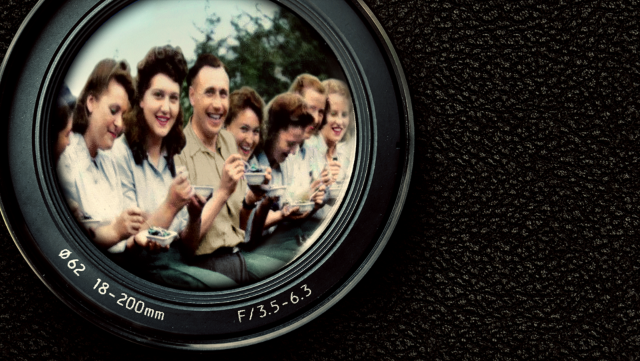Here There Are Blueberries at NY Theatre Workshop
Co-produced with Tectonic Theater Project
By: Susan Hall - May 29, 2024
Over and over again, in the Pulitzer-nominated play Here There are Blueberries, now playing at the New York Theatre Workshop in co-production with Tectonic Theater Project, we see photos of the commandants of the Auschwitz facility where the final solution was executed. They are comfortable, laughing together, being rewarded for work well done (gassing people) and in lounge chairs at a spa retreat on the property in Poland.
These bland photographs never bore. We never tire looking at them in David Bengali’s projection design. Each time they appear on a large screen, often accompanied by the sound of the camera's snap, we are again agog: Germans knew what was going on in the camps. Everyone knew. The women assigned jobs as telegraph operators knew. And there they sit, relaxing and eating blueberries.
Here There Are Blueberries is conceived and directed by Laramie Project creator, Moisés Kaufman, and a finalist the Pulitzer Prize for drama. Amanda Gronich is Mr. Kaufman’s co-writer.
An American military officer found the album and gave to the United States Holocaust Museum in Washington DC. Its history is complicated. Most of the Holocaust museums around the world, including the one in Washington, look at the lives of the victims and not the perpetrators. At first the Washington staff resisted the album: Were we now to celebrate the lives of the men and women who vowed to make a world free of Jews?
Examination of the album leads to the upending of Susan Sontag’s theories about photography. More than any other art form, photography is subject to intense moral scrutiny. Sontag worried about subjects’ consent to be photographed and also that a photograph could be deceptive. Sontag wrote:“To photograph people is to violate them.” Taking a photograph gives us the illusion of participation and so on. Sunny snapshots may be isolating for both photographer and viewer.
Now we watch photograph after photograph as their relevance is discussed by museum curators. Whatever we are being told, it is banal repetition, as Hannah Arendt would have it, that makes their revelations relevant.
We are looking at men and women who knew exactly what was going on: the murder of human beings en masse, often rolled one on top of another into trenches. (Not to say that we are off the hook in the US where one of our main industries for centuries appropriated land without compensation for plantations and debated endlessly to what extent an outcast group of humans was human and could simply be used for unpaid labor).
There is no artfulness in the photographs: no framing, no lighting, no effort to capture the defining moment. Sheer accumulation horrifies. We have to look.
Mr. Kaufman directs excellent performances by all the cast members. Elizabeth Stahlmann plays both an historian of the Holocaust and author Rebecca Erbelding. Kathleen Chalfant is a survivor and memoirist Judy Cohen. Charlie Thurston as Rainer Hoss, the commandant’s grandson, says,. “My family always said to the press: ‘We never saw anything.’ They knew exactly what was going on, what happened on the other side of their wall.”
This is a thoughtful and compelling stage work that must be seen.
Tickets here.

